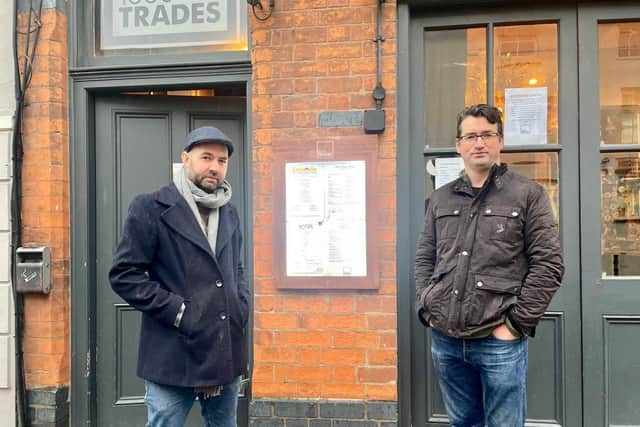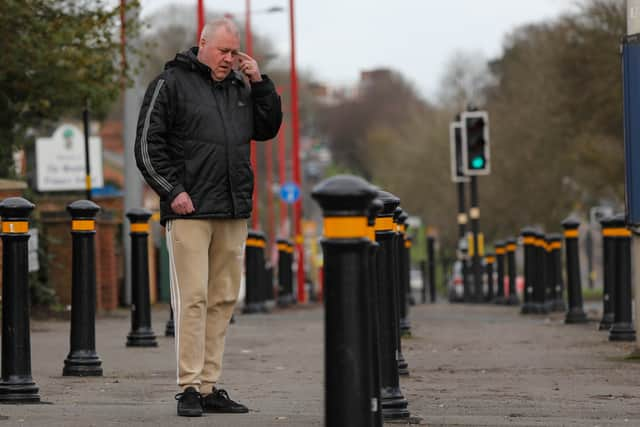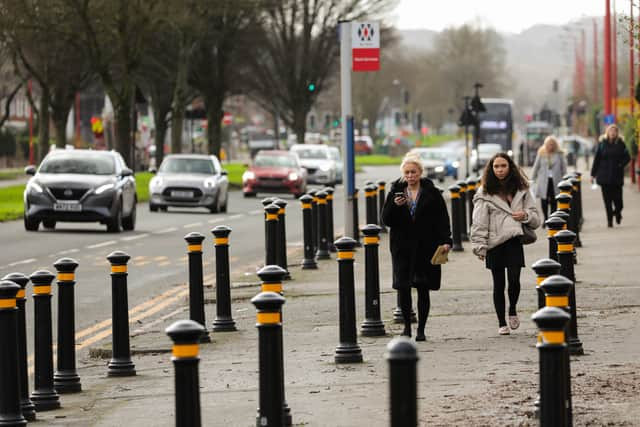Birmingham bar owner urges council NOT to remove bollards outside his Jewellery Quarter venue
and live on Freeview channel 276
The owner of an established restaurant in the Jewellery Quarter has asked Birmingham City Council why it is making “life even harder” for businesses who want to keep their outdoor dining areas.
John Stapleton, the co-owner of 1,000 Trades, has put forward a question to the local authority this week claiming hospitality businesses have “benefited hugely” from the removal of parking spaces – allowing customers to dine outside - with bollards protecting the space.
Advertisement
Hide AdAdvertisement
Hide AdBut Birmingham City Council says outdoor dining was introduced under temporary legislation, and as such, can be subject to change. The council has recently come under fire for a different set of bollards that it put in place on the A38 Bristol Road in Northfield - with some describing the 60 bollards put along a 50 metre stretch as “bonkers”.
Speaking to the Local Democracy Reporting Service (LDRS) before the meeting, Mr Stapleton said: “It’s been a lifeline for us having five picnic tables and the bollards outside our premises for trade during the summer, especially coming through the pandemic.
“We’ve heard the council are proposing to remove them which will have a detrimental effect on our revenues. We’re asking the council to reconsider, especially with lots of costs and the cost of living crisis coming to our sector.”
Mr Stapleton asked the council: “Hospitality businesses like ours and others in the Jewellery Quarter have benefited hugely from the removal of parking bays outside to allow customers outside in the summer months.
Advertisement
Hide AdAdvertisement
Hide Ad“These parklets are largely in the same condition as when they were installed less than two years ago. Yet the council now proposes to remove these parklets.
“Why does the council want to make life even harder for businesses burdened with pandemic debt, massive increases in costs and the recession?Many pubs have closed in Birmingham in recent years and unfortunately, this trend is likely to continue – encouraged by the removal of parklet. Is there no way that the council can support these vital businesses by having the parklets remain?”


Responding to Mr Stapleton’s question, councillor Clements said: “We’ve had to make some difficult decisions about the future about the temporary paving we’ve seen outside during Covid. We haven’t taken this lightly.
“I would like to emphasise that these measures were temporary. The tarmac, rack and bollards represent a trip hazard and are a barrier to wheelchair users, people with reduced mobility, and to parents pushing prams, especially in places where roads are quite steep as it is by your premises.
Advertisement
Hide AdAdvertisement
Hide Ad“The Jewellery Quarter is also a conservation area. The materials needed for the temporary measures are not the standard we want it to be. We very much support your desire to have some outside seating. In the future with the Birmingham Transport Plan we will look at the future of the Jewellery Quarter and how we move to pedestrianisation.”
The row over outdoor dining and the pedestrianisation of cities come after the Traffic Orders Procedure (Coronavirus Amendment) Regulations 2020 Act enabled many Birmingham restaurants, cafés and pubs to use the outdoor space since the pandemic.
The regulations made it easier for local authorities to authorise extended road closures so that pubs could accommodate customers without breaking social distancing rules.
But the temporary regulations ended in October 2022, which means that outdoor structures, such as decked areas or gazebos in the road, will no longer be allowed.


Advertisement
Hide AdAdvertisement
Hide AdEmails seen by the LDRS suggest Mr Stapleton first contacted the deputy leader of Birmingham City Council, Brigid Jones, in November 2022. In the email Mr Stapleton explained that while he was grateful for the council providing a “lifeline” of outside seating area during the summer months, he said the replacement of outdoor tables with parking spaces would be a “retrograde step”.
He said: “We feel very strongly that removal of this area and replacement with parking spaces would be a retrograde step. Not only because of the real value of this outside space in helping us get back on our feet after a torrid period for our sector, but also the apparent favouring of cars over neighbourhood businesses such as ours in the context of the council’s laudable strategy to encourage liveable streets.”
But in a response email seen by the LDRS councillor Liz Clements, the cabinet member for transport, said there were “difficult decisions” to be made about temporary paving licences (TPL) in the Jewellery Quarter.
She listed various reasons why some highway elements “prevent [TPL] from being retained as a permanent solution”, including the “appropriateness of the materials” in the Jewellery Quarter – a conservation area.
Advertisement
Hide AdAdvertisement
Hide AdShe said: “There are important issues related to these highway elements which prevent them from being retained as a permanent solution. There is a road safety and equality concern related to the ramps – they present an unnecessary trip hazard and a barrier to wheelchair users and people with reduced mobility. Also, to parents pushing prams.
This is aggravated at locations where the road gradient is steep, which is the case of 1000 Trades and St Paul’s House. A secondary concern is the appropriateness of the materials, they do not align with the palette used by the council […] and would need to be replaced with more expensive kerbs and paving flags.
“The level of funding available at the time of implementing the measures was insufficient to deliver the standard of quality required for the measures to be retained permanently – neither was it permissible under the funding rules referred to above.”


Councillor Clements accepted there was a “clear appetite” to reduce or remove cars in the Jewellery Quarter, but said businesses would have to be “prepared to make compromises and accepted the need for behaviour change”.
Advertisement
Hide AdAdvertisement
Hide AdShe said: “The transport planning team will work with the city planners and the Jewellery Quarter BID, and I understand that a neighbourhood plan has recently been published to guide some of this work strategically.
“All of this of course is due to availability of funding and ongoing stakeholder support – if businesses in the Jewellery Quarter wish to benefit from this transformation of the area, they must be prepared to make some compromises and accept the need for behaviour change in terms of loss of parking – including for their customers -and more managed approaches to servicing and loading.
“We are sorry that we are not able to take a different position on 1000 Trades TPL in the short term, but hopefully you can see that there are positive opportunities on the horizon,” she concluded.
You can watch back the full council meeting here.
Comment Guidelines
National World encourages reader discussion on our stories. User feedback, insights and back-and-forth exchanges add a rich layer of context to reporting. Please review our Community Guidelines before commenting.